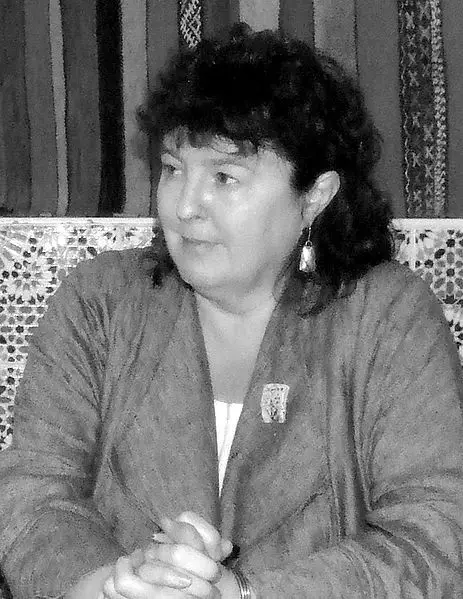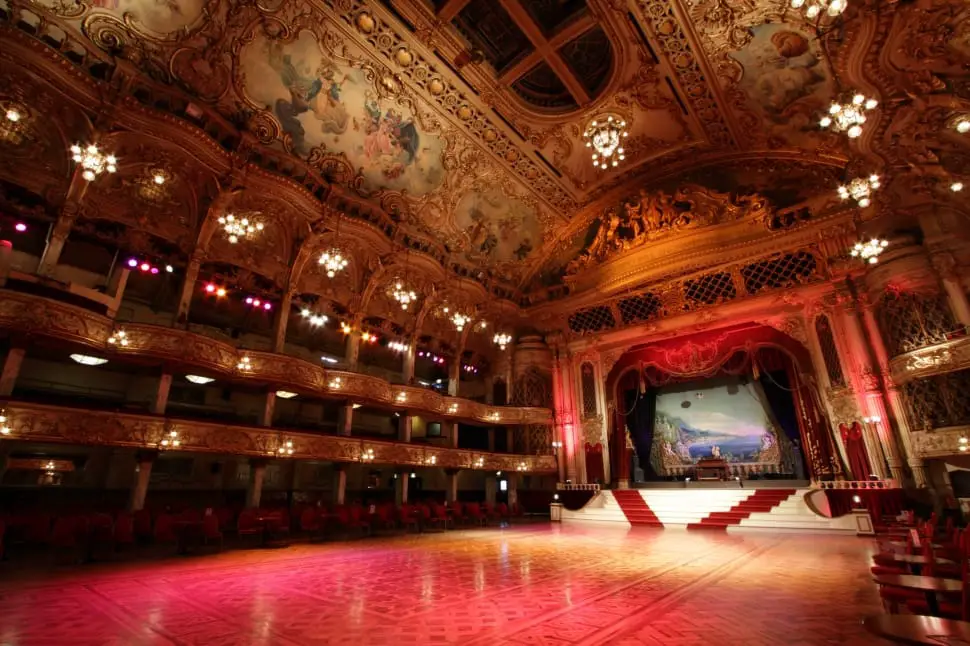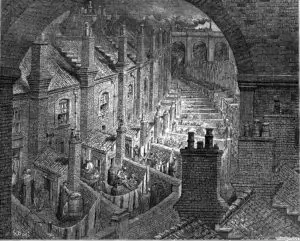
FULL POEM - SCROLL DOWN FOR LINE-BY-LINE ANALYSIS
I’m ten years away from the corner you laugh on
with your pals, Maggie McGeeney and Jean Duff.
The three of you bend from the waist, holding
each other, or your knees, and shriek at the pavement.
Your polka-dot dress blows round your legs. Marilyn.
I’m not here yet. The thought of me doesn’t occur
in the ballroom with the thousand eyes, the fizzy, movie tomorrows
the right walk home could bring. I knew you would dance
like that. Before you were mine, your Ma stands at the close
with a hiding for the late one. You reckon it’s worth it.
The decade ahead of my loud, possessive yell was the best one, eh?
I remember my hands in those high-heeled red shoes, relics,
and now your ghost clatters toward me over George Square
till I see you, clear as scent, under the tree,
with its lights, and whose small bites on your neck, sweetheart?
Cha cha cha! You’d teach me the steps on the way home from Mass,
stamping stars from the wrong pavement. Even then
I wanted the bold girl winking in Portobello, somewhere
in Scotland, before I was born. That glamorous love lasts
where you sparkle and waltz and laugh before you were mine.

LINE-BY-LINE ANALYSIS
STANZA 1
I’m ten years away from the corner you laugh on
The speaker is a child writing about how they imagine their mother to have lived prior to and then after their birth. The present tense used throughout the poem to narrate the past creates a vivid image which immerses the reader in the speaker’s imagination of their mother’s lifestyle. Notably, the concept of time is expressed like the concept of distance as the speaker describes being ‘ten years away from the corner’. However, unlike distance this temporal separation can never be overcome, emphasising that neither the speaker of their mother can ever return to this point in time which reflects the life-changing impact (which the speaker views as negative) that the speaker’s birth had on their mother.
with your pals, Maggie McGeeney and Jean Duff.
The three of you bend from the waist, holding
each other, or your knees, and shriek at the pavement.
In these first two stanzas, the speaker envisages the life of their mother prior to their birth. The picture Duffy paints is one of joy, laughter and friendship.
Your polka-dot dress blows round your legs. Marilyn.
Marilyn Monroe was an American actress, model and singer, most famous for becoming one of the most popular sex symbols of the 1950s and early 1960s, the period of this narrative. She was emblematic of the era’s changing attitudes towards sexuality and included here by Duffy as a symbol of the speaker’s mother’s own glamour and sexuality.
STANZA 2
I’m not here yet. The thought of me doesn’t occur
At the time that they are imagining, the speaker has not yet been born and ‘the thought of [them] doesn’t occur’ to her carefree mother at the time, for whom children are the last thing on her mind. The speaker’s tone is seemingly jealous – perhaps feeling that their mother enjoyed her life much more prior to settling down and having children.
in the ballroom with the thousand eyes, the fizzy, movie tomorrows
The ‘thousand eyes’ highlight the grandeur of the occasion and can additionally be interpreted to represent male eyes drawn to the speaker’s mother.
the right walk home could bring. I knew you would dance
‘The fizzy, movie tomorrows the right walk home could bring’ refer to the act of courtship, with the ‘right walk home’ being one accompanied by a man interested in her, potentially to his house and not hers. The ‘fizzy, movie tomorrows’ is a metaphor for her fantasy of finding a handsome, successful man and living happily ever after with him.
like that. Before you were mine, your Ma stands at the close
with a hiding for the late one. You reckon it’s worth it.
The title, ‘before you were mine’ is repeated here and is a possessive phrase demonstrating the speaker’s feeling that they restrict their mother from living the life that she desires, flipping the traditional roles of the maternal relationship on its head. The speaker views her mother’s life at this time as one of freedom, despite being restrained and disciplined by her own mother (a traditional maternal relationship) who gives her ‘a hiding’ for her lateness.
STANZA 3
The decade ahead of my loud, possessive yell was the best one, eh?
This rhetorical question conveys the speaker’s assumption that the decade prior to their birth in which the events of the previous two stanzas took place were the golden years of their mother’s life. They feel guilty about cutting this period short, sure that their birth and the presence of a demanding infant and their ‘loud, possessive yell’ would have negatively impacted on their mother’s quality of life.
I remember my hands in those high-heeled red shoes, relics,
The ‘high-heeled red shoes’ that the speaker remembers playing with as a young child are ‘relics’ of the mother’s past glamour and romance. In this case their importance to the speaker is derived from their symbolism of the time that they believe their mother was happiest.
and now your ghost clatters toward me over George Square
till I see you, clear as scent, under the tree,
with its lights, and whose small bites on your neck, sweetheart?
The mother’s ‘ghost’ could seemingly be her in the present day, as a ghost of the woman that the speaker imagined in the first three stanzas. However, it’s clear that this is not the case as the speaker cheekily asks (a further instance of the reversal of the traditional maternal relationship) about the ‘small bites’ (or love bites) on their mother’s neck – another symbol of her romantic youth. Instead, ‘ghost’ links to how this version of the speaker’s mother in the present day is confined to the speaker’s imagination and does not exist in reality, with her youth being left in the past. The simile ‘clear as scent’ is an example of synaesthesia, a technique in which one sense, sight in this case, is described using terms from another, smell in this case. Duffy utilises this technique to illustrate just how vivid the speaker’s imagination of their mother is.
STANZA 4
Cha cha cha! You’d teach me the steps on the way home from Mass,
The “cha-cha” is a sensual dance with Latin American rhythm popular in the 1950s, acting here as another reference to the mother’s romantic youth as well as a contextual symbol for the time period being post-war Britain.
stamping stars from the wrong pavement. Even then
The phrase ‘stamping stars’ from the wrong pavement juxtaposes the phrase ‘the right walk home’ from the second stanza. It implies that the speaker’s mother ultimately never did find herself on ‘the right walk home’ and as a consequence she took, and still does, the wrong path in life, taking her ever further away from the ‘fizzy, movie tomorrows’ she dreamed of whilst dancing at the ballroom in her youth.
I wanted the bold girl winking in Portobello, somewhere
in Scotland, before I was born. That glamorous love lasts
where you sparkle and waltz and laugh before you were mine.
The poem concludes with the speaker expressing how they want the youthful, imagined version of their mother to actually be in their life now, instead of her present-day form – an impossible and unreasonable desire seeing as their birth marked the beginning of her lifestyle change. The triplet, ‘sparkle and waltz and laugh’ is a syndetic list (whereby words in the list are separated by conjunctions instead of a comma) which highlight the abundance of these joyful and vibrant qualities that the speaker’s mother had in her youth. As a consequence, it further emphasises the extent of the impact that the speaker’s birth had on her lifestyle, transforming her from being this young woman full of life to now being a ghost of her former self. The repetition of the title ‘before you were mine’ as the poem’s final words express the speaker’s adamancy that their birth undoubtedly marked the onset of this transformation.


